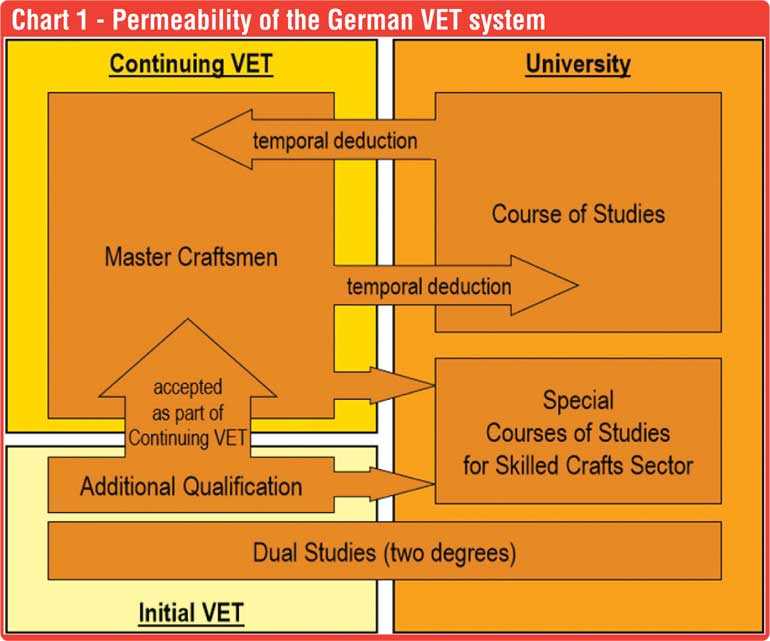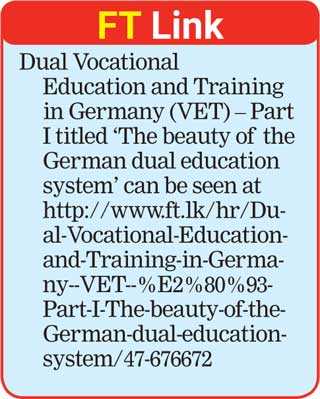Wednesday Feb 18, 2026
Wednesday Feb 18, 2026
Tuesday, 14 May 2019 00:00 - - {{hitsCtrl.values.hits}}
Dual Vocational Education and Training in Germany (VET) – Part II

The skilled crafts sector in Germany is not “arts and crafts” or “historic crafts,” but professions carrying out small-scale, individual production and maintenance (mostly local SMEs), said German Confederation of Skilled Crafts (ZDH) Department of VET Head of Unit Dr. Hendrik Voß.
 |
ZDH Department of VET Head of Unit Dr. Hendrik Voß |
 |
Outlining the system to ensure the supply of skilled staff in Germany via the skilled crafts sector, he said the law determines which professions are skilled crafts and ensures compulsory membership of enterprises in chambers of skilled crafts.
Skilled crafts professions include building and interior finishing, electrical and metalworking, woodcrafts and plastics, clothing, textiles and leather crafts, food crafts, health and body care, chemical and cleaning sector, graphic design and so on.
He noted that skilled crafts in Germany presently comprises one million companies with 5.4 million employees (13% of Germany’s total workforce), 380,000 apprentices (27% apprentices total in Germany) and records € 500 billion annual turnover.
The ZDH is one of the main national employers’ associations and has two umbrella-organisation members: Deutscher Handwerkskammertag (DHKT) and Unternehmerverband Deutsches Handwerk (UDH). ZDH’s main role is to manage general decision-making process within the Handwerk lobby for Handwerk nationally and internationally and centrally keep all statistics of Handwerk.
The following information was obtained from the presentation by Dr. Voß.
Basic Handwerk principles
German VET system – Initial Vocational Training (“dual system”)
Why do companies educate and pay apprentices?
The funding of the system
Necessary conditions: Companies pay an apprenticeship allowance; companies impart cross-company qualifications; length of apprenticeship programs ensure the required skill levels.
Implications: Companies must employ apprentices in a productive way; productive apprentices learn in a very efficient way.
Conclusion: Net investments by the companies are not required; a governmental redistribution is not required; and a governmental labour market regulation is not required.
Scientific research shows:
However, such linking-up cannot be provided by the state.
Continuing vocational training
Continuing vocational training (master craftsperson) is possible in about 100 professions.
This contains four sections:
Section I – masterly practical performance (individually for each profession)
Section II – trade specific theory knowledge (individually for each profession)
Section III – economics and regulations (standardised for all professions)
Section IV – teaching and training skills (standardised for all professions)
The preparation courses are full-time (about one year) or part-time (up to two years). They are a precondition in 41 professions for setting up own business and are EQF-classified to be on level with Bachelor-degree (level 6 of 8).
Support for international cooperation projects
The skilled crafts sector and its organisations are able to offer international cooperation projects support to establish chamber-like structures to deliver VET consultancy for SMEs, examinations in VET, and quality assurance in VET; company-based training systems by developing labour market-oriented curricula, offering the training of (in-company) trainers, and developing labour market-oriented assessment structures; and inter-company training centres; in addition to expertise on marketing vocational education and training.
(The Daily FT participated in a programme on Dual Vocational Education and Training in Germany at the invitation of the Federal Foreign Office in March this year.)